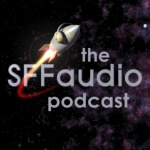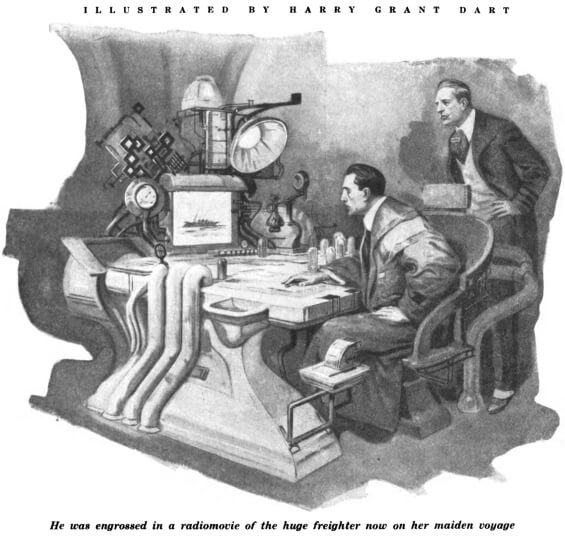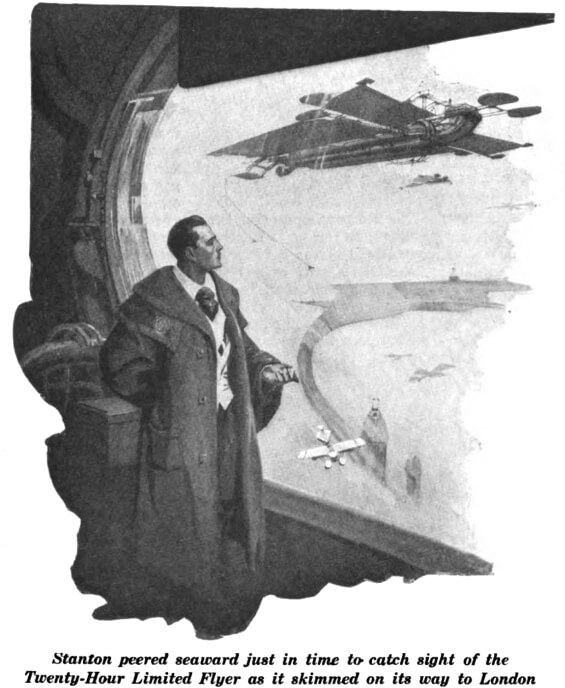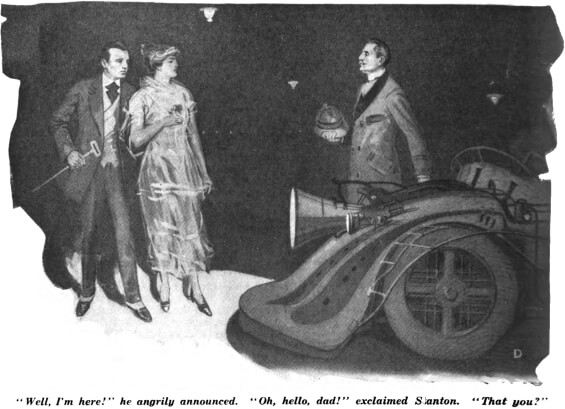
 Reading, Short And Deep #144
Reading, Short And Deep #144
Eric S. Rabkin and Jesse Willis discuss The Revolt Of The… by Robert Barr
Here’s a link to a PDF of the story.
The Revolt Of The… was first published in The Idler, May 1894.
Posted by Scott D. Danielson

 Reading, Short And Deep #144
Reading, Short And Deep #144
Eric S. Rabkin and Jesse Willis discuss The Revolt Of The… by Robert Barr
Here’s a link to a PDF of the story.
The Revolt Of The… was first published in The Idler, May 1894.
Posted by Scott D. Danielson

 The SFFaudio Podcast #429 – Jesse, Marissa, Mr Jim Moon and Wayne June talk about the Tantor Media audiobook In the Mountains of Madness: The Life, Death, And Extraordinary Afterlife Of H. P. Lovecraft by W. Scott Poole.
The SFFaudio Podcast #429 – Jesse, Marissa, Mr Jim Moon and Wayne June talk about the Tantor Media audiobook In the Mountains of Madness: The Life, Death, And Extraordinary Afterlife Of H. P. Lovecraft by W. Scott Poole.
Talked about on today’s show:
a biography (not the novel), who would make that mistake, W. Scott Poole, The Extraordinary Afterlife Of H.P. Lovecraft, the writing style, some reservations, a very interesting book, S.T. Joshi, Michel Houellebecq, current thoughts about Lovecraft, have we all fallen into a trap?, there must be something wrong with him, first biography, I Am Providence, primary materials, letters to the editors, here’s Lovecraft’s vision, man, Lovecraft’s childhood, why do we care so much, a forerunner, his mom and his wife, everybody hears about Lovecraft’s mom: he’s hideous looking, the L. Sprague DeCamp biography, a strange man with an ugly lantern jaw, Stephen King, progressive and interesting, an open minded woman, his politics, cautiously taking issue, Lovecraft’s racism, history, a crock of bull, dismissing the man of his time argument, science, eugenics, racial theory, phrenology, condemns overly harshly, divorcing the work from the creator of it, celebrating his creativity without celebrating his politics, what if Rembrandt was a wife-beater, a conservative, his grandfather, a pedestal, we all get our politics from our parents and our family, unusual and extreme, not a happy fact, commonplace views, The Birth Of A Nation, bringing Lovecraft away, strange and creative, humanizing, they weren’t terrible mad women, playful, reading Shakespeare, annoying the neighbours, psychoanalysis, they must be psychopaths, a wax cylinder, Lovecraft’s singing was like a fox terrier being strangled, cats and ice-cream, good evidence, an admirable person, an only parent, every kind of toy, chemistry sets and magazine subscriptions, school as torture and punishment, she sounds awesome, expand your mind in different ways, he’s filling in gaps with a lot of speculation, really interesting new evidence, non-standard childhood behavior, starting a detective agency after you’re playing dungeons and dragons style wargames, .22 pistol, tailing suspicious looking characters all over Providence, an absurdly early age, Sarah Susan Lovecraft, conclusions, this book is so 2016/2017 with suppositions, hard to argue with facts, beyond precioucious, Mr Jim Moon’s rubbish detective agency, toddlers with automatic weapons, gun control, football, every male was given a badge that ranked them beta or delta, fuck you society!, ugly vs. striking, William Hope Hodgson, going with it and going against it, amateur journalism and reading pulp magazines, why my sympathy resonates with Lovecraft in his stories, he’s interested in school, Teddy Roosevelt, Kermit Roosevelt, war was masculine, WWI was a mistake, pulled some strings, a strange sickly twilight individual, a walker and rambler vs. mad recluse, go for a walk and read books, social anxiety and mild depression, most of the people Jim knows, the subtitle, becoming H.P. Lovecraft, the stories themselves, August Derleth and Cthulhu plushies, Hypnos, Hypnos tattoos, very funny, a sarcastic take on the hipsters, THE answer, the secret history of why today is the way it is today, Gary Gygax comic book biography, Little Wars by H.G. Wells, war-gaming, the great grandfather of modern gaming, he’s not really a fantasist in most cases, Wells’ stamp, Doctor Who could not exist without The Time Machine, Lovecraft’s marriage to Sonia Greene, she bank rolled amateur journalism (their version of blogging or podcasting), The United Amateur, she comes off pretty well as a wife, he comes off pretty badly, a raconteur, carousing, a dynamic person, the teenage daughter, Lovecraft’s stepdaughter, some beautiful poetry, I’m after him, completely unemployable, he’s a rich man who has come down in the world, Lovecraft’s main attempt to make money was to revise other people’s writing, Marissa can make a living, Wayne can make a living, one ad in Weird Tales, rewriting, 100,000 letters, Ted Chiang, unwilling to compromise, manual labour, his job-seeking letter, 17th furniture was the peak of furniture design, no normal customer, mattresses mattresses mattresses, extraordinarily striking, he can’t grant his wife a divorce, his own worst enemy, he didn’t want a job, 14-18 hours a day, get yourself a Sonia, never ate in a restaurant, alone in their cave, not the normal thing, was H.P. Lovecraft a gay man?, his only woman kisser, time spent, some gay friends, his first love was books and writing, M.R. James, there might might be some very racy letters we’ll never see, asexuality, an old flame, we shouldn’t go there, he’s like most people, relationships are difficult, completely open-minded, he had the opportunity with R.H. Barlow, dwelling, everybody was in love with Lovecraft, it’s great to spend time with a brilliant mind, a 14 year old fan, Jesse’s students, interesting ideas, talking about art or sports, really normal, spending time with heroes, letters back and forth, Clark Ashton Smith, Robert E. Howard, kind of a leap, getting together in physical space, we think he’s fascinating, trying to explain the fascination, a name to conjure with, a funky coffee house, a bowler hat and a tattoo with Lovecraft’s face, why Lovecraft plays a huge role as a totemic symbol, buying books with his name on the side, sex toys, Savage Sword of Conan, the Lovecraft influenced stories of Robert E. Howard, how did Mr Jim Moon discover Lovecraft, The Hound, Stephen King’s Danse Macabre, Trail Of Cthulhu, the role playing game, hitting thew jackpot, battered old paperbacks, Wayne’s dad was an SF reader, a stationery store’s upstairs, a metaphor of some kind, half-way up the ladder, Cool Air, it gave me chills, becoming obsessed with Lovecraft, what was in the used bookstore, do you think his writing style sets you up for that?, one of those writers, a bigger thrill everytime, like Shakespeare, into the flow, richer and richer, At the Mountains Of Madness, a gift card for Chapters, filed in the biography section, Scott Danielson, damn it!, the audiobook is missing the back-matter, Necronomicon fake-lore, good essays about Lovecraft by Angela Carter and Colin Wilson, the Chaosium Necronomicon, related short stories, The Adder by Fred Chapel, corrupting neighbouring books, why “In” in the title, forgotten perfectly, Lovecraft’s dad: ‘the chamber maid has insulted me and strange men are raping my wife’, sanitarium, he was “noisy”, the treatment was enemas every second day, damaged genitals, Poole’s theory, syphilis, Guy de Maupassant, in the background of Lovecraft’s psychology, bringing the sexual horror to the surface, high on morphine, not a friendly way to go, talking insensibly, high on opioids, that’s fucked up, drugs, who knows?, lose yourself in some good comic books because life is fucking horrible, the core of Lovecraft’s philosophy, Lovecraft thought about suicide, so polite, he hasn’t learned enough about geology yet, not the coward’s way out, Howard’s suicide, a lot more depressive, powerful and beautiful, The Thing On The Roof, getting right into the action, the requisite ending, in touch with that horror, why worry about getting married when you’re worried about how mortal you are, a lot of sympathy, marriage instead of suicide, what’s missing, what was Lovecraft doing all those years when he wasn’t writing?, astronomy, running clubs, becoming something, the eighth biography?, there’s something going on, he’s pointed to a lot of things, some much at odds with the myth of Lovecraft, he’s maladjusted, he’s anti-social, seven weeks of blackberry picking, Winnie the Pooh, more to the man, off the hip astrology, the intentional fallacy, a secret autobiography, what makes a weird tale, a whole other side, chit chatting with friends, walks and get-togethers, a different picture emerges, did you come here to praise him or bury him, a hatchet job, sour grapes, de Camp, he finds other people’s writings, that’s not great, get a handle on a whole life, it feels like we get to know him, a person we can know, incredibly like having a friendship, where did this mythology come from?, The Conspiracy Against The Human Race by Thomas Ligotti, people don’t like them, you have to do that, death is waiting for each and every one of us, existence is horrible, taking a step-back from you, reputation and mythology, absolutely an athiest, a pessimist, an atheistic existentialist, they don’t like it, an academic, a course on Lovecraft, what was H.P. Lovecraft’s philosophy?, material, atheism, cosmicism, racism, Cthulhu plushie racist, a quick bit of googling, it’s everywhere, something you have to get passed, tentacles, I like coffee, Freudian symbolism, who have you been dating?, chimera, the irony is bigger, I Am Providence, now he’s dirt, the fortune he was heir to and then lost, made it’s money from whaling, The Shadow Over Innsmouth, compromise, working at a gas station, humiliating, his worldview, bemoaning the decline of the aristocracy, pledged allegiance to King George, an unrepentant Tory, The Rats In The Walls, why we’re so interested in the man, writing true, making hay out of trends, the flavour of the week, no skin of his nose, rejected, he could suffer any indignity, a beautiful tragedy, it could have been a lot worse, he was so generous, the lord dispensing wealth, he was giving out what he wished he had recieved, mentoring, Robert Bloch, a life-line in the amateur press, fan letter, highfalutin poetry, the marketing came after by his fans, my point for Wayne, I could make Wayne so much money, he needs a Patreon, Audio Realms is out of business, the complete H.P. Lovecraft one book a month, some sort of barrier, it’s like you can’t lower yourself to that, he’s just lazy, you’re still alive, you’re killing me, At The Mountains Of Madness is a big job, that book is an expedition, Poole makes an argument that Prometheus is a retelling of At The Mountains Of Madness, Who Goes There? by John W. Campbell, a massive debt to Lovecraft, a link still unexplored, a thing podcast, thing it, them, they!, the mysterious pronouns in dark places.

Posted by Jesse WillisBecome a Patron!

 Reading, Short And Deep #074
Reading, Short And Deep #074
Eric S. Rabkin and Jesse Willis discuss Goblin Market by Christina Rossetti
Here’s a link to a PDF of the poem.
Goblin Market was first published in 1862.
Posted by Scott D. Danielson

 Reading, Short And Deep #035
Reading, Short And Deep #035
Eric S. Rabkin and Jesse Willis discuss The Painter Of Dead Women by Edna Worthley Underwood
Here’s a link to a PDF of the story.
The Painter Of Dead Women was first published in The Smart Set, January 1910.
Posted by Scott D. Danielson


 The SFFaudio Podcast #372 – June 6, 2016 by George Allan England; read by Julie Davis of A Good Story Is Hard To Find. This is an unabridged reading of the short story (52 minutes) followed by a discussion of it. Participants in the discussion include Jesse, Paul Weimer, Julie Davis, and Maissa Bessada.
The SFFaudio Podcast #372 – June 6, 2016 by George Allan England; read by Julie Davis of A Good Story Is Hard To Find. This is an unabridged reading of the short story (52 minutes) followed by a discussion of it. Participants in the discussion include Jesse, Paul Weimer, Julie Davis, and Maissa Bessada.
June 6th, 2016 was first published in Collier’s in April 22, 1916.
Talked about in this episode:
as a story, a fine imagination about all the technologies we’ll have in the future, a time capsule to open after 100 years, storytelling aside…, accurate predictions?, a historical artifact, Looking Backwards, what were you thinking, nothing is accurate, a third right, if you squint real hard, a terrible plot, the sappiest romance, he foresaw Marilyn Monroe, he got texting, radio movies = television, any particular paragraph, technology and social change, alcohol isn’t made anymore, socialist pushing, prohibition, that experiment failed, smoking is still in fashion (but falling out of favor), unless you’re sanitized, he got Skype right (kinda), wouldn’t it be great if we could…, burning our clothes, everything is made of paper and only used once, paper underwear, it’s illegal to make noise or to be sick, as a dystopian story, “Repent, Harlequin!” Said The Ticktockman by Harlan Ellison, free public transit, everything is aluminum, everything is regulated, weather regulated, cloud seeding, from the Territory of Patagonia to the State of Labrador, the President of England, the 1970s push for the metric system in the USA, everyone is cooperating now, the United States of Asia, the Asian fleet is stationed in Hawaii, Japan or China, they made NAFTA really work, the TPP, a 2016 airplane that’s already broken, the anti-grav element, automation from a distance, the self driving car, the “Tesla” thing, more Philip K. Style, 250km per hour, the Trans-Atlantic aircraft, how amazing that would have sounded, he got some things right, why this story is so extraordinary, Philip K. Dick’s 2016, a slice of life from one day 100 years into the future, what he got right, 28 million people live in New York, a social trend that nobody predicted (except for Clifford Simak), Make Room, Make Room, Stand On Zanzibar, what Science Fiction is doing, the “where’s my flying car” or “where’s my jetpack?” phenomenon, obsessed with hygine, Purell everywhere, there’s no crime in this story, she was promised more rain, what makes one a great writer, the human element, the essence of the story, the role of women, a 1960s lady, and his heart melted, businesses actually paying their taxes, the kind of socialism we can get behind, everyone knows what everyone is doing all the time, everybody knows where everybody is, convenience vs. Big Brother, everyone has everything they need, children are to be seen and not heard, where’s the children, Brave New World without the drugs, Soma in the ozoneators, the women’s suffrage movement, the Prohibition movement, every leap year women got the opportunity to ask men to marry them, marriage, cellphones (or satphones) telepathy, a slidewalk as in The Roads Must Roll by Robert A. Heinlein, Iridium Satphone, an urgent telepathic call from Hong Kong, bluetooth technology, the Sub-Atlantic tube, a trans-atlantic tunnel, Channel Tunnel, email, video ads on the subway, newspapers are completely gone, how much would George Allan England like us talking about this story on this date?, headphones, what a world of wonders we do live in, to George, we’re not there yet (for non-commercial cremation), filling in New York harbour, we bend nature to our will, the big eugenics thing, the eugenics board, the fallacy of eugenics, Muhammad Ali, how fallible and foolish people are, alcohol going out of fashion, turning off alcohol would be like banning marriage, The Drunken Botanist, the benefits of alcohol, people in 9,000bc, the archaic art of letter writing, a little gesture of the time, investing in the characters, the PDF is a bit hard to read, muting the feminine philosophy, feminism, he will make more in the end, the images, did the art come first and the story follow?, etherically connected, centrally regulated atomic clocks, a Pickwick Papers situation, Charles Dickens, the illustrator died, monthly installments, the invention of the cliffhanger, Paul is related to Charles Dickens.



Posted by Jesse Willis

 Reading, Short And Deep #006
Reading, Short And Deep #006
Eric S. Rabkin and Jesse Willis discuss Friend Island by Francis Stevens
Friend Island was first published in All-Story Weekly, September 7, 1918.
Here’s a link to the PDF of the story.
Posted by Scott D. Danielson